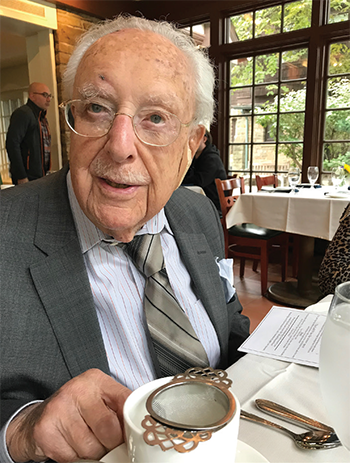
Dr. Caplan at age 106 on Nov. 21, 2018.
Editor’s note: It is with much sadness that we learned this morning that Paul Caplan, MD, passed away yesterday, March 7, 2020. “He was a remarkable person who continued to celebrate life up to the end,” says Terence W. Starz, MD, University of Pittsburgh School of Medicine. “He had a great caring, wisdom, and commitment that he gave unselfishly to his family, patients, friends, and the community. He was a model physician who dedicated his life to provide the best care he could to his patients. Paul will be missed; however, his spirit and gifts will live on and provide guidance for all of us.”
About Dr. Caplan: Story from December 2018
A doctor will embark on many different journeys throughout his or her career, often listening to and learning from patients just as much as he or she is caring for and educating them.
Paul S. Caplan, MD, knows the importance of embracing life’s journeys, having spent seven decades practicing medicine in widely different settings, situations and specialties. Drawn to medicine at the early age of nine, Dr. Caplan was inspired by a traveling doctor who once treated his mother. He knew that he wanted to dedicate his life to helping patients, just as this doctor had done for his family.
Dr. Caplan, who practiced medicine until the age of 96, created his legacy on the importance of constantly evolving his craft, learning from his patients and bettering his discipline. After graduating from the University of Pittsburgh School of Medicine in 1936, he completed his internship at Montefiore Hospital. His career has left him with many notable experiences, such as treating wounded soldiers on Omaha Beach after D-Day and traveling for more than 20 years as the Pittsburgh Symphony Orchestra tour physician.
“It was a privilege to be a part of each of my patients lives,” Dr. Caplan remarks as he thinks about his career. “I think that the secret to success is to do what you like to do. Allow the work to be your hobby.”
In 1960, Dr. Caplan received a grant from the National Institutes of Health to study how osteoarthritis of the spine affects the physical capabilities of coal miners. He spent four years observing these miners and, ultimately, helped change the way they received health benefits. He also traveled to Haiti and treated a wide variety of ailments and diseases outside his specialty of rheumatology. During his time there, Dr. Caplan dedicated himself to understanding this new field.
“I carried a textbook and learned as I went,” he said. “I asked questions, and more importantly, I listened.”
Dr. Caplan served as a professor of medicine at the University of Pittsburgh from 1946 through 2012. He was a Fellow at the American College of Physicians; a 2004 ACR Master; and a member of the American Medical Association, the Pittsburgh Rheumatism Association, and the Pennsylvania and Allegheny County Medical Societies. He also authored dozens of publications over the years, covering various research topics and treatments for arthritis.
Through all of Dr. Caplan’s professional triumphs, continued learning and patient care were always at the center of his work. In the spirit of education, he extended his reach into the philanthropic sector, creating the Dr. Paul S. Caplan Award in Rheumatology with his late wife, Gertrude. The award provides support to a fellow or resident physician in the Division of Rheumatology and Clinical Immunology at the University of Pittsburgh, so that an individual who embodies this same spirit may continue to pursue his or her training.
At 106 years old, Dr. Caplan now reflects fondly on his long and accomplished career. Sitting in his home in Oakland, Calif., surrounded by countless awards and accolades, Dr. Caplan thought of his advice to current students.
“Remember the art of listening,” he said. “Take time to hear about the whole life of the patient, not just the disease. If you treat your practice as an avocation, not just a vocation, it will never be work.”
The School of Medicine honored Dr. Caplan and his accomplishments on May 22, 2017, at the 2017 Graduation Ceremony and Medical School Diploma Day. He received the Lifetime Alumnus Achievement Award from the School of Medicine and Medical Alumni Association. If you are interested in learning more about the Dr. Paul S. Caplan Award in Rheumatology, contact Ed Nemanic at 412-647-5395.
Editor’s note: Reprinted with permission from the Medical Alumni Association at the University of Pittsburgh.



